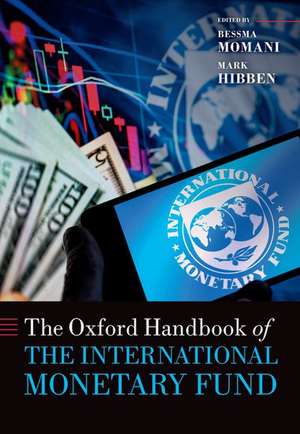Oxford Handbook of the International Monetary Fund
Bessma Momani, Mark Hibbenen Limba Engleză Hardback – 17 oct 2024
Preț: 973.76 lei
Preț vechi: 1462.57 lei
-33% Nou
Puncte Express: 1461
Preț estimativ în valută:
186.38€ • 193.84$ • 156.18£
186.38€ • 193.84$ • 156.18£
Carte disponibilă
Livrare economică 10-15 februarie
Preluare comenzi: 021 569.72.76
Specificații
ISBN-13: 9780192858405
ISBN-10: 0192858408
Pagini: 800
Dimensiuni: 175 x 250 x 50 mm
Greutate: 1.57 kg
Editura: OUP OXFORD
Colecția OUP Oxford
Locul publicării:Oxford, United Kingdom
ISBN-10: 0192858408
Pagini: 800
Dimensiuni: 175 x 250 x 50 mm
Greutate: 1.57 kg
Editura: OUP OXFORD
Colecția OUP Oxford
Locul publicării:Oxford, United Kingdom
Notă biografică
Dr. Bessma Momani is Associate Vice-President, International and Full Professor in the Department of Political Science at the University of Waterloo. She is a senior fellow at the Centre for International Governance Innovation, a Fulbright Scholar, a Governor on the board of the International Development Research Centre, and a member of the advisory board of the Canadian International Council. She has worked as a consultant to the International Monetary Fund, both in the communications office and the Independent Evaluation Office, and to Global Affairs Canada (GAC) as a 2021 Visiting Scholar in its International Assistance Research and Knowledge Division.Dr. Mark Hibben is Associate Professor of Political Science at Saint Joseph's College of Maine. His research interests include the politics of development, with a specific focus on the International Monetary Fund and World Bank. Book publications include the co-authored (with Bessma Momani) What is Wrong with the IMF and How to Fix It (Polity) and Poor States Power, and the Politics of IMF Reform: Drivers of Change in the Post-Washington Consensus (Palgrave Macmillan). His work is also published in The Review of International Organizations, Journal of International Organizational Studies, and The Journal of International Relations and Development.
